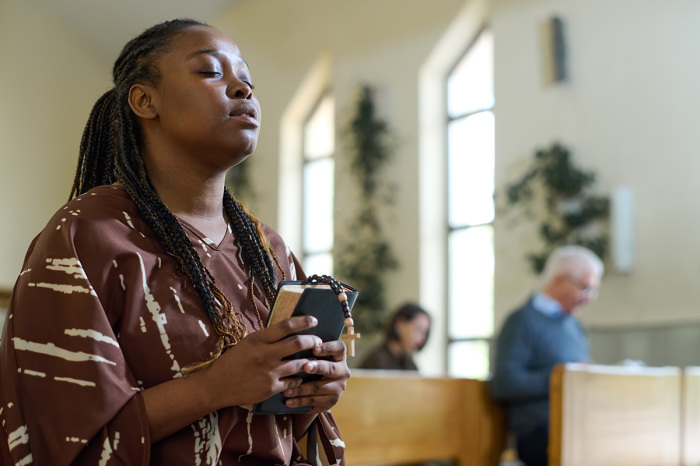Religiosity linked to positive well-being outcomes: study

A new study reveals that religious people tend to have better mental health outcomes than their non-religious counterparts, a phenomenon that is more pronounced in more religious countries.
Gallup, in conjunction with the Radiant Foundation, released a new report titled "Faith and Wellness: The Worldwide Connection Between Spirituality & Wellbeing" on Oct. 10. The study, based on interviews of 1.5 million people across 152 countries conducted as part of the Gallup World Poll from 2012-2022, compared scores of religious and non-religious people on indexes designed to measure an individual’s well-being.
On the positive experience index, which asks people if they have experienced enjoyment, smiled or laughed a lot, been treated with respect, learned something or felt well-rested, religious people had an average score of 69, slightly higher than non-religious people’s average score of 65. The survey stressed that “each one-point difference represents an effect for an estimated 40 million adults worldwide.”
Therefore, the report states, “an estimated 160 million more adults have positive experiences than would be the case if those adults were not religious.”
Similarly, religious people had an average score of 77.6 on the social life index, while non-religious people had an average score of 73.7. The social life index measures whether people are satisfied with their “opportunity to meet people and make friends” and have people they can “call on” if they are in trouble.
Religious people had an average score of 49.4 on the optimism index, slightly ahead of their non-religious counterparts’ 48.4. The optimism index examines whether people feel positively about their lives in five years, if they think their standard of living is improving and if they believe the local economy is getting better.
On the community basics index, which samples people’s opinions about their “environment, housing and infrastructure,” religious people had an average score of 59.7, while non-religious people’s average score was 55.7.
For three additional well-being indexes, the differences between religious and non-religious people showed no meaningful difference: the likelihood to classify themselves as either “thriving” or “suffering” on the life evaluation scale and the local economic confidence index that measures people’s feelings about “local economic conditions.”
Only on the negative experience index — which measures the frequency with which an individual experienced worry, sadness, anger, stress and physical pain on the previous day, and the personal health index, which asked people if they had health problems, felt well-rested and felt physical pain, worry and sadness much of the previous day — did religious people score worse than their non-religious counterparts.
On the negative experience index, where the object is to receive a lower score, religious respondents (31.4) scored higher than non-religious people (29.9). On the personal health index, non-religious people had an average score of 68.6, while religious respondents had an average score of 66.9.
However, the report found religious respondents scoring higher on well-being indexes than the non-religious was most pronounced in more religious countries than less religious countries. The report defined “more religious countries” as those where 90% or more of the population identified religion as “important” in their daily life, assigned the label of “moderate religious countries” to nations where 66-80% of the population said the same, and classified “less religious countries” as those where 65% or less view religion as “important.”
In every well-being index examined, religious people scored better than the non-religious in more religious countries, although there were no meaningful differences in scores on the negative experience index and the local economic confidence index.
In moderately religious countries, religious respondents scored better on six out of nine indexes, including the optimism index, where the difference was not meaningful. In those countries, the non-religious scored higher than the religious on the life evaluation indexes and the personal health index.
The differences between religious and non-religious respondents’ average scores on the life evaluation indexes and the personal health index in moderately religious countries were not meaningful. In the less religious countries, which include the United States, only on the community basics index do religious people score higher than the non-religious. In these countries, the non-religious score better on the negative experience index and the personal health index, mirroring the overall results.
In the less religious countries, the religious scored slightly better than the non-religious on the positive experience index, the social life index and one of the two life evaluation indexes, although the differences were not determined to be meaningful. Other non-meaningful differences favoring the non-religious were measured in the other life evaluation index and the optimism index.
In addition to scoring better on most well-being outcomes, religious respondents also demonstrated higher levels of civic engagement than the non-religious in every region of the world examined. Globally, religious people had an average score of 35.8 on the civic engagement scale that measures “people’s inclination to volunteer their time and assistance to others,” while the non-religious had an average score of 31.
The gap between non-religious and religious people’s scores on the civic engagement scale was largest in Northern America, where the religious had an average civic engagement score of 58.8 and the non-religious were far behind at 48.5. The difference between non-religious and religious people’s civic engagement was smallest in the Middle East and Northern Africa. In this region, non-religious respondents achieved an average score of 31.4, while the religious had an average score of 33.1.
Ryan Foley is a reporter for The Christian Post. He can be reached at: ryan.foley@christianpost.com





























